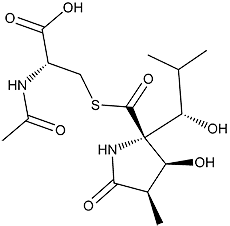Lactacystin: world’s first proteasome inhibitor

Lactacystin
Proteasomes are high molecular weight, multi-catalytic protease cellular enzyme complexes responsible for most non-lysosomal intracellular protein degradation. They can be found inside all eukaryotes, archaea and some bacteria. In normal cells, the proteasome regulates protein expression and function by breaking down ubiquitylated proteins and cleanses the cell of abnormal proteins. Proteasomal degradation is essential for many vital cellular processes, including the cell cycle, the regulation of gene expression and responses to oxidative stress.
Lactacystin inhibits progression of the cell cycle, the proteasome seeming to be the sole or main target of the compound. Lactacystin is the only known truly specific inhibitor of the proteasome and it has proven essential for studying a wide range of cellular systems and processes.
We isolated lactacystin from the culture broth of Streptomyces lactacystinaeus in 1991, originally as an inducer of neurite outgrowth in Neuro 2a cells (a mouse neuroblastoma cell line). The structure of lactacystin includes a non-peptide skeleton consisting of two alpha-amino acids, N-acetylcysteine and a novel pyroglutamic acid derivative. Lactacystin was the first non-peptidic proteasome inhibitor discovered and has subsequently been extensively exploited as a research tool in biochemistry and microbiology. It covalently bonds with and modifies the amino-terminal threonine of catalytic β-subunits of the proteasome, particularly the β-5 subunit responsible for the proteasome's chymotrypsin-like activity. Consequently, the proteasome itself is regarded as a novel class of enzyme: an amino-terminal threonine protease.
Lactacystin and its cell-permeable β-lactone form (designated omuralide by Prof E. J. Corey), which are structurally different from the synthetic peptide aldehydes, are highly specific proteasome inhibitors. These specific inhibitors have facilitated studies of proteasome function, leading to many unexpected findings about the importance of the ubiquitin-proteasome pathway in various cellular processes, such as the cell cycle, apoptosis, antigen presentation and the degradation of regulatory or membrane proteins. The major significance of proteolytic degradation inside cells, together with the role of ubiquitin in proteolytic pathways, is reflected by the fact that the research attracted the 2004 Nobel Prize in Chemistry, the work being heavily influenced and made possible by the discovery and use of lactacystin.
Proteasome inhibitors have substantial anti-tumour activity in cell culture, inducing apoptosis by disrupting the degradation of pro-growth cell cycle proteins. The ability of proteasome inhibitors to selectively induce apoptosis in rapidly dividing cells has been exploited in the development of several recent cancer chemotherapy agents. Bortezomib (marketed as Velcade®, Neomib® and Bortecad®) was the first proteasome inhibitor to enter clinical use as a chemotherapy agent in the treatment of multiple myeloma. In some cancers, proteins that usually kill cancererous cells are broken down too quickly. Bortezomib prevents this and lets the proteins kill the cancer cells. Animal studies have also indicated that bortezomib may have clinically significant effects in pancreatic cancer. Preclinical and early clinical studies have subsequently been started to examine bortezomib's effectiveness in treating other B-cell-related cancers, particularly some types of non-Hodgkin's lymphoma.
Ritonavir (marketed as Norvir®) was developed as a protease inhibitor aimed at treating HIV/AIDS infection. However, while it inhibits the chymotrypsin-like activity of the proteasome, the trypsin-like activity is somewhat enhanced. Ritonavir was originally developed as an HIV protease inhibitor but it is now rarely used on its own, instead being deployed as a booster of other protease inhibitors, as it is known to inhibit a particular liver enzyme that normally metabolizes protease inhibitors. Studies in animal models suggest that ritonavir may have inhibitory effects on the growth of glioma cells.
Proteasome inhibitors have recently shown promise in treating autoimmune diseases in animal models. Studies in mice bearing human skin grafts found that proteasome inhibitors reduce the size of lesions from psoriasis, with other inhibitors also displaying positive effects in rodent models of asthma.

